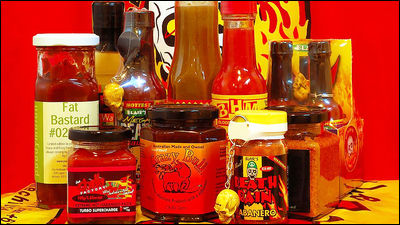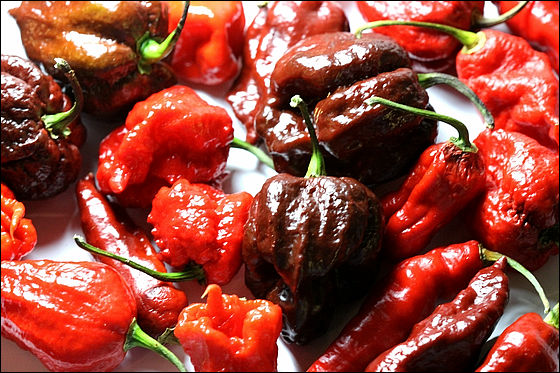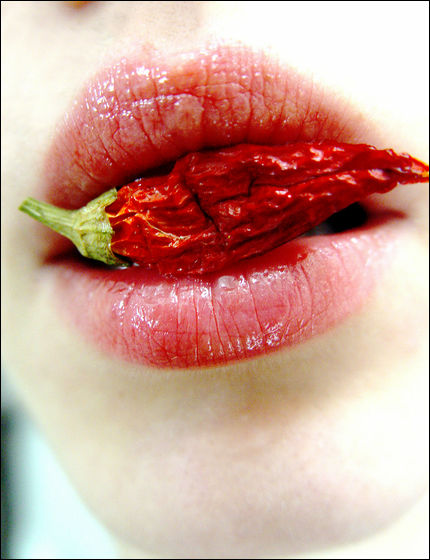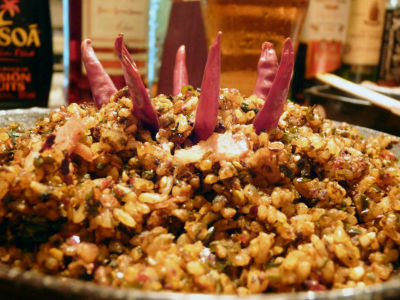Why do you love the painful "hot spicy"?

ByJes
For those who are not tolerant, it is something other than pains, and even those familiar with it, it is sometimes expressed as "painful" as a hot spicy food. People who like spicy things usually seek a more hot spicy food, avoiding pain that you would like to avoid as you normally would, but a variety of research on mysterious addictive mysteries caused by such hot spicy food We are.
The mysteries of chili heat: Why people love the pain - Salon.com
http://www.salon.com/2015/02/07/the_mysteries_of_chili_heat_why_people_love_the_pain/

If you eat too hot food, you will feel pain and physiological phenomena such as perspiration will appear. Research that unravels such physiological phenomena has been ongoing for many years, and in the old days, Mr. TS Lee of the Singapore University biologist conducted an experiment that 46 young people eat pepper and observe reactions in 1953 . In order to observe the sweating effect, the subjects wore cotton bread only, painted with facial, ears, neck and upper body with iodine tincture, and sprinkle cornstarch from above. According to these two kinds of combinations, the subject's sweat will turn blue.
Mr. Lee is often used in Asian cuisine, ten to twenty times harder than JalapeñoCapsicum(Capsicum annuum) was purchased. When the subjects eat this, the face began to flush in 5 minutes, and the flush portion expanded to the whole body. Sweating was recognized only around the nose and mouth, and no rise in body temperature was noticed. To compare by sweetness, acidity, bitterness and temperature,Sweet sucrose(Kanji perfomance) ·quinine· As a result of verification with oatmeal of acetic acid · potassium alum · black pepper · tobacco · toazu, the same effect as chili was recognized in acetic acid and black pepper.
Capsicum intake does not raise body temperature, but "sweating" brings about an increased body temperature cooling effect, so it means that you do not need unnecessary sweat. In order to ascertain whether this reaction is the same as the perspiration caused by heat, when the volunteer's feet were attached to the hot water, sweating of the same pattern as when capsiche was ingested was observed as the body temperature rose. Since the subjects felt pain on the lips without taste receptors, "Pungency is treated as a kind of" pain sensation "in the body," Lee says.
Moreover, it is said to be the hardest pepper in the world "Carolina · ReaperEating in the mouth will eat. Capsaicin has been used as an analgesic for centuries ago because capsaicin has the effect of causing pain and blocking. In addition to being used to rub the capsicum to the reproductive organs, native American people used it to slow the sensation and put off sexual pleasure, and in the 19th century China local anesthesia for castration surgery It was said that it was also used as an agent.

ByRichard Elzey
Of naturally occurring super powerful capsaicin analoguesResiniferatoxin(RTX) is a terrible substance that it is 16 billion Scoville in terms of Scoville that quantifies pungency and it is 1000 times harder than usual capsaicin. Lee focused on RTX and conducted experiments using rats. Rats injected into the skin with a trace amount of RTX became hypothermia, unlike anesthetics, it was found that it acts only on the nerves that feel fever without causing reaction such as pain sensation.
As a result of continuing these experiments, it was found that ingested RTX and capsaicin were absorbed by the previously unknown "capsaicin receptor". The receptor is intended to sense heat and pain, and it plays a role of a sensor to detect threats. The capsaicin receptor is embedded in the surface of the nerve cells around the mouth, skin, eyes, ears, and nose, and the reflection such as "let's go to the hot pot inadvertently by letting you inadvertently" is due to the reaction of this receptor. Eating chili peppers acts on these receptors and lowers the limits of heat around the mouth, so it seems hot when you eat pepper.

ByLenchensmama.
According to Paul Rosin, a psychologist who conducts research on "aversion", no animal that likes pungency in nature has been identified, and it was discovered that foods containing spices can be avoided even in experiments using rats doing. In addition to the use of capsicum extract for tear-drop spray, in India we used Boot Joloquia "Chili pepper grenadeHave also been developed and are a pungent ingredient of capsicumCapsaicinIs a thing that can give a danger to human beings too.
On the other hand, rats know that they avoid foods containing spices, but Mr. Rosin has continued to eat rats mixed with spices in small amounts, but after a while the rats have begun to choose foods with spices Thing. Even humans are more resistant to Mexicans than Americans than Americans, so continuing to eat hot foods will change the resistance value to pungency. So why do humans get drawn to foods that have peculiar pungent tastes?

Mr. Rosin says, "For example, as with childbirth, humans can tolerate routine pain to gain greater rewards." The next day when I felt happy after drinking I was annoyed by a hangover. There are also people who seek drunkenness until illegal drugs endanger life. According to Mr. Rosin, "Love for hot spicy food" is like a combination of these two elements, and is in a state of enjoying having finished safe eating in search of pain without risk such as bleeding. Rosin said: "It's like a roller coaster, eating chili isMasochismIt may be a new form of "It is concluded.
Related Posts:







